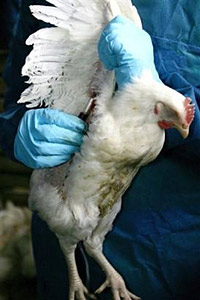 |
 |
 |
 Health & Beauty | November 2005 Health & Beauty | November 2005  
U.S. Could Restrict Travel to Prevent Flu
 Lauran Neergaard - Associated Press Lauran Neergaard - Associated Press


| | A veterinary simulates a bird flu test on a chicken in a poultry farm in Kergloff, western France, Thursday, Nov. 3, 2005, as part of a two-day program of possible virus prevention, and treatment. France will devote an extra euro177 million (US$213 million) to double its 2005 spending on planning against a feared human pandemic of bird flu. (AP Photo/Vincent Michel) |
Washington - Sustained person-to-person spread of the bird flu or any other super-influenza strain anywhere in the world could prompt the United States to implement travel restrictions or other steps to block a brewing pandemic, say federal plans released Wednesday.

If a super-flu begins spreading here, states and cities will have to ration scarce medications and triage panicked patients to prevent them from overwhelming hospitals and spreading infection inside emergency rooms, the plan says.

It provides long-awaited guidance to the front-line local officials urging them to figure out now how they would prevent that and to practice their own plans to make sure they'll work.

Pandemics, or worldwide outbreaks, strike when the easy-to-mutate influenza virus shifts to a strain that people have never experienced before, something that happened three times in the last century.

It's impossible to predict the toll of the next pandemic, but a bad one could infect up to a third of the population and, depending on its virulence, kill anywhere from 209,000 to 1.9 million Americans, say the Bush administration's new Pandemic Influenza Plan.

The illness will spread fastest among school-aged children, infecting about 40 percent of them, and decline with age, the plan estimates. It puts the health costs alone, not counting disruption to the economy, at $181 billion for even a moderately bad pandemic.

It's also impossible to predict when the next pandemic will strike. But concern is rising that the Asian bird flu, called the H5N1 strain, might trigger the next one if it eventually becomes easily spread from person-to-person.

With a public increasingly jittery about the H5N1 spread among birds and a drumbeat of criticism that the nation is woefully unprepared, President Bush on Tuesday outlined a $7.1 billion strategy to get ready for the next pandemic. Topping his list is improving systems to detect and contain the next super-flu before it reaches the United States and overhauling the vaccine industry so that eventually, scientists could quickly brew enough for everyone within months of a pandemic's appearance.

That vaccine improvement will take years to implement and the details released Wednesday stress that early on, the public will be depending on scarce supplies of anti-flu drugs and stockpiled vaccines and old-fashioned ways of limiting viral spread.

Stockpiled drugs "are not the equivalent of preparedness," Health and Human Services Secretary Mike Leavitt told a Senate subcommittee Wednesday as he unveiled the details.

Indeed, the plan stresses that if a pandemic begins, Americans should limit visits to doctors and hospitals unless absolutely necessary and hospitals should triage those seeking care so that suspected super-flu cases have limited contact with other patients, the plan says.

But critics battered Bush's plan for the federal government to stockpile enough of the anti-flu drugs Tamiflu and Relenza to treat 44 million people and make states buy another 31 million treatment courses, mostly with their own money, to cover the rest of the anticipated need.

"States are extremely nervous about what's going to be required of them," Sen. Patty Murray, D-Wash., told Leavitt.

And Sen. Arlen Specter, R-Pa., said he doesn't trust the administration's assessment of the nation's health care needs and demanded that Leavitt provide more information about its response to the evolving bird flu.

"Could we have acted sooner to avoid the situation we are in now, in effect running for cover?" he said. "We need a better way of finding out what the hell is going on." | 
 | |
 |



